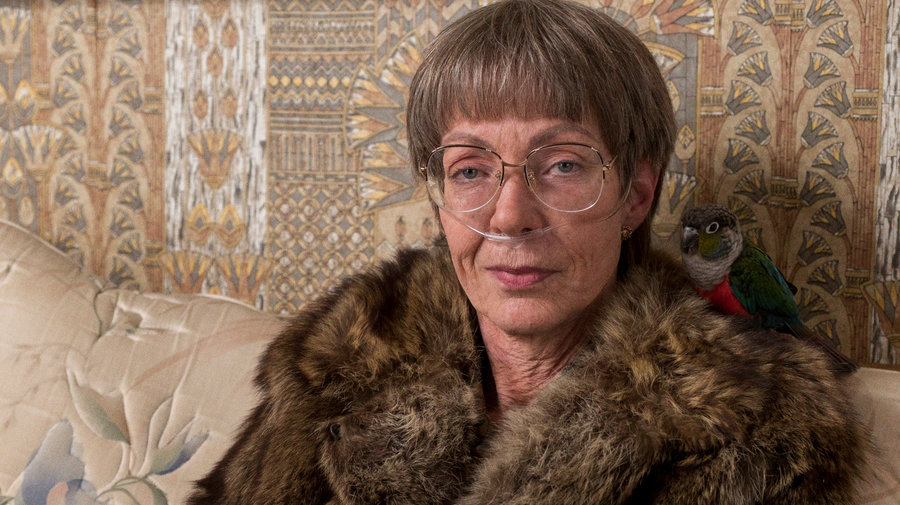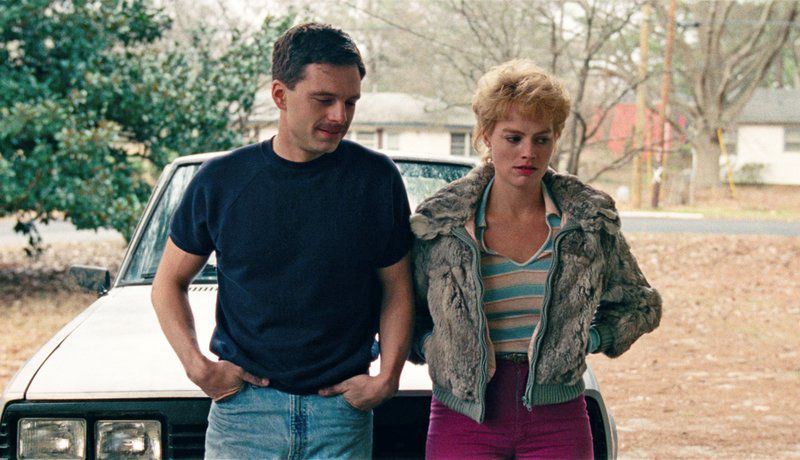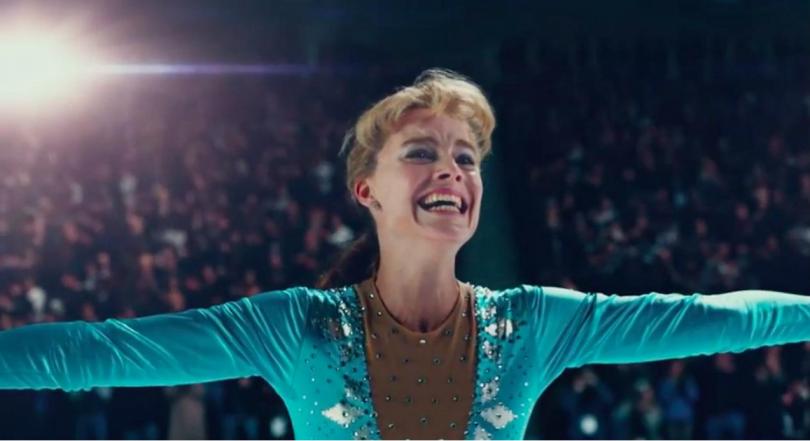I, Tonya (2017)
CAST: Margot Robbie, Sebastian Stan, Alison Janney, Paul Walter Hauser, Julianne Nicholson, Bobby Cannavale, McKenna Grace
REVIEW:
I, Tonya is not a straightforward docudrama of the infamous 1994 assault on figure skater Nancy Kerrigan that implicated her rival Tonya Harding, Harding’s husband Jeff Gilooly, and other associates. Rather, director Craig Gillespie and screenwriter Steven Rogers have tackled the material as a dark comedy which in the third act has tinges of something the Coen Brothers might have come up with (given the amount of criminal bumbling that takes place, that’s a not altogether inappropriate approach to take). The movie takes its material from the sometimes completely contradictory interviews of Harding, Gilooly, and others, giving us multiple unreliable narrators, and also asks us to, if not necessarily condone or exonerate Harding, to come to at least some measure of understanding of what led up to the moment that, fairly or unfairly, would define her.
That I, Tonya is fully embracing the “unreliable narrator” trope is made immediately obvious when we kick off by alternating between multiple “present day” interviews with Tonya Harding (Margot Robbie), her ex-husband Jeff Gilooly (Sebastian Stan), Tonya’s mother Lavona (Alison Janney), and Tonya’s self-appointed ex-“bodyguard” Shawn Eckardt (Paul Walter Hauser), who all spin wildly contradictory versions of events. With this as our jumping off point, we flashback forty years earlier to Portland, Oregon, where the child Tonya (McKenna Grace) is pushed mercilessly to become a figure skating champion by her domineering, abusive mother Lavona. Tonya becomes a child prodigy, but despite her technical excellence on the ice, she is looked down on for her “white trash” image and cheap homemade costumes, which steers the judges toward preferring the more wholesome, “princess” images of her competitors eventually including Nancy Kerrigan (Catlin Carver). Meanwhile, Tonya strikes up a romance and eventual marriage with Jeff Gilooly (Sebastian Stan), who seems nice at first but soon shows an abusive side. Despite her turbulent personal relationships, Harding has a crowning achievement in 1991 when she becomes the first female figure skater to land a triple axle, a move deemed so difficult it had rarely even been attempted. However, her attempt at replicating it at the 1992 Winter Olympics falls flat on its face (literally), and she lands at a disappointing fourth place behind her friend and competitor Nancy Kerrigan. Seemingly down and out, Tonya gets a second shot at Olympic gold for the 1994 Olympics, but when she’s rattled by an anonymous death threat, this gives Jeff the bad idea of putting his dim-bulb buddy Shawn Eckardt up to sending a similar death threat to Kerrigan to throw her off her game. Seeking notoriety, Eckardt exceeds his instructions (or does he?) and recruits a couple of goons to break Kerrigan’s kneecap. While Tonya and Jeff’s level of involvement/knowledge of “the incident” becomes hotly contested between their and Eckardt’s wildly contrasting accounts, the ballooning scandal overshadows Tonya’s accomplishments and, after a disappointing eighth place at the Olympics, she is ultimately implicated in the assault and banned from figure skating for life.
 The movie seeks to delve beneath the persona of a real-life individual who has been a pop culture “villain” and punchline for decades and present her as a dimensional human being wearing neither horns nor a halo. There’s subtext about class issues; the movie raises the suggestion that Harding was sometimes unfairly snubbed in favor of technically inferior skaters because she wasn’t the wholesome, clean-cut image the judges preferred, though Tonya doesn’t help her own cause when she responds to a disappointing score with a profanity-spewing tirade in front of the judges and entire audience. At one point, Tonya acerbically comments that Nancy Kerrigan got hit once and it was a worldwide scandal, but she got hit every day and no one cared. By her own admission, she accepts her husband’s abuse because she’d been conditioned to regard it as normal from her mother. The movie floats the idea that, having already been abused by her mother and husband, Tonya at last was abused again by the media and the public and was more victim of circumstances than criminal mastermind.
The movie seeks to delve beneath the persona of a real-life individual who has been a pop culture “villain” and punchline for decades and present her as a dimensional human being wearing neither horns nor a halo. There’s subtext about class issues; the movie raises the suggestion that Harding was sometimes unfairly snubbed in favor of technically inferior skaters because she wasn’t the wholesome, clean-cut image the judges preferred, though Tonya doesn’t help her own cause when she responds to a disappointing score with a profanity-spewing tirade in front of the judges and entire audience. At one point, Tonya acerbically comments that Nancy Kerrigan got hit once and it was a worldwide scandal, but she got hit every day and no one cared. By her own admission, she accepts her husband’s abuse because she’d been conditioned to regard it as normal from her mother. The movie floats the idea that, having already been abused by her mother and husband, Tonya at last was abused again by the media and the public and was more victim of circumstances than criminal mastermind.
In addition to cutting back-and-forth between the action and the “talking heads” narration of Harding, Gilooly, Lavona, and Eckardt, the movie also occasionally breaks the fourth wall during the flashbacks to have Tonya make a sarcastic aside to the camera, sometimes to contradict a scene based on Gilooly’s version of events. These provide plenty of opportunity for black comedy, such as a bit where Tonya chases Jeff out the door with a shotgun, then turns to the camera and deadpans “I never did this”, or when Alison Janney’s Lavona briefly interrupts the action to complain about her own “storyline” not getting enough attention. The wacky criminal shenanigans that commence in the third act seem like something out of Fargo and fall into “truth is stranger than fiction” territory. Some of the actions undertaken by Gilooly, Eckardt, and Eckardt’s hired goons are incredibly goofy, but they actually happened. Eckardt’s goons, staked out in their car outside of Kerrigan’s ice rink, spend hours on end changing parking spots every fifteen minutes in an entirely counterproductive attempt to avoid suspicion. To cap off their incompetence, they don’t even manage to cripple Kerrigan (who was merely bruised), but they do manage to get lost in the building afterward and have to smash a glass door to get out. On their way to an FBI summons, Gilooly rattles off a pep talk to Tonya about keeping their cool and giving nothing away, then gets hysterically flustered under questioning. But while Gilooly might not be the sharpest knife in the drawer, Eckardt is even worse, a bumbling wannabe criminal mastermind with delusions of grandeur who unconvincingly claims to be an international counter-terrorism expert (in reality he is unemployed and lives in his mother’s basement) who despite convoluted attempts at subterfuge before the assault, immediately starts bragging about it to anyone who will listen afterwards, then cracks like an egg under FBI questioning.
 I, Tonya features three strong lead performances, all of which involve sinking under the skin of real-life individuals. Margot Robbie shows her commitment to the lead role by de-glamorizing herself to immerse herself in a role that hinges more on her acting abilities than her looks, and also by doing at least a fair amount of her own onscreen figure skating. It’s the kind of immersive performance that attracts awards attention, not only burying herself in Tonya Harding’s unglamorous, “white trash” looks and persona, complete with Midwestern accent and potty mouth, but presenting her as a three-dimensional human being who is no angel but in some ways was a victim of circumstances vilified beyond what she deserves (at least in the movie’s take on the story). Once just another pretty face, Robbie has shown her range in recent years by playing everything from Tarzan’s love Jane, to Harley Quinn, to now Tonya Harding. Alison Janney likewise has no reservations about fully committing to an unpleasant character, playing Lavona as an acerbic, foul-mouthed stage mom who never has a kind word to say no matter her daughter’s accomplishments (if she has any reserves of true affection, it’s for her pet parrot which sits perched on her shoulder during her interview). Lavona defends her treatment of her daughter as a “tough love” training regimen aimed at pushing her to be the best she can be—“sometimes a child wants to be corrected”—but her methods run up to straight-up abuse, such as when she refuses to let the child Tonya take a break until she urinates on herself, then forces her to continue skating without cleaning up, slaps her around, and at one point throws a knife at her. Lavona is short on encouragement but never short on scathing one-liners and insults, and Janney spits them out with venom (she’s a bit like a darker and more serious version of Jane Lynch’s Sue Sylvester from the TV series Glee). Sebastian Stan, who like Robbie has downplayed his good looks behind Jeff Gilooly’s dorky mustache (and looks nothing like Captain America‘s Winter Soldier), plays Gilooly as a classic example of an insecure man who hits a woman to defend his fragile masculinity. Jeff isn’t as black-and-white a “villain” as Lavona; he’s outwardly meek and unassertive (Stan met the real Gilooly to adopt his mannerisms and soft, almost effeminate voice). At his best, he’s an affectionate and supportive husband, and we can buy there is genuine affection on some level, but his insecurity and temper brings out his uglier impulses. Stan’s appearances in Captain America/Avengers installments might bring him some high-profile exposure, but his character actor-esque role here gives him far more room to show his acting abilities. Paul Walter Hauser is the almost unbelievably inept Shawn Eckardt, the character onhand who feels the most like he could have wandered straight in out of a Coen Brothers farce, and smaller roles include Julianne Nicholson as Tonya’s coach, Bobby Cannavale as a tabloid reporter, and McKenna Grace as the child Tonya.
I, Tonya features three strong lead performances, all of which involve sinking under the skin of real-life individuals. Margot Robbie shows her commitment to the lead role by de-glamorizing herself to immerse herself in a role that hinges more on her acting abilities than her looks, and also by doing at least a fair amount of her own onscreen figure skating. It’s the kind of immersive performance that attracts awards attention, not only burying herself in Tonya Harding’s unglamorous, “white trash” looks and persona, complete with Midwestern accent and potty mouth, but presenting her as a three-dimensional human being who is no angel but in some ways was a victim of circumstances vilified beyond what she deserves (at least in the movie’s take on the story). Once just another pretty face, Robbie has shown her range in recent years by playing everything from Tarzan’s love Jane, to Harley Quinn, to now Tonya Harding. Alison Janney likewise has no reservations about fully committing to an unpleasant character, playing Lavona as an acerbic, foul-mouthed stage mom who never has a kind word to say no matter her daughter’s accomplishments (if she has any reserves of true affection, it’s for her pet parrot which sits perched on her shoulder during her interview). Lavona defends her treatment of her daughter as a “tough love” training regimen aimed at pushing her to be the best she can be—“sometimes a child wants to be corrected”—but her methods run up to straight-up abuse, such as when she refuses to let the child Tonya take a break until she urinates on herself, then forces her to continue skating without cleaning up, slaps her around, and at one point throws a knife at her. Lavona is short on encouragement but never short on scathing one-liners and insults, and Janney spits them out with venom (she’s a bit like a darker and more serious version of Jane Lynch’s Sue Sylvester from the TV series Glee). Sebastian Stan, who like Robbie has downplayed his good looks behind Jeff Gilooly’s dorky mustache (and looks nothing like Captain America‘s Winter Soldier), plays Gilooly as a classic example of an insecure man who hits a woman to defend his fragile masculinity. Jeff isn’t as black-and-white a “villain” as Lavona; he’s outwardly meek and unassertive (Stan met the real Gilooly to adopt his mannerisms and soft, almost effeminate voice). At his best, he’s an affectionate and supportive husband, and we can buy there is genuine affection on some level, but his insecurity and temper brings out his uglier impulses. Stan’s appearances in Captain America/Avengers installments might bring him some high-profile exposure, but his character actor-esque role here gives him far more room to show his acting abilities. Paul Walter Hauser is the almost unbelievably inept Shawn Eckardt, the character onhand who feels the most like he could have wandered straight in out of a Coen Brothers farce, and smaller roles include Julianne Nicholson as Tonya’s coach, Bobby Cannavale as a tabloid reporter, and McKenna Grace as the child Tonya.
Some will take issue with I, Tonya, feeling it portrays Tonya Harding overly sympathetically or downplays her guilt in the Kerrigan incident. As its title indicates, the movie is at least primarily from Harding’s perspective, and she was reportedly a consultant to the production. There are undoubtedly other movies which could be made from other viewpoints about the same incident which would paint a different picture, at least some of which would surely involve a more villainous Tonya. A movie focusing on Nancy Kerrigan (who has a minor role here) might look far different. But this is I, Tonya, not I, Nancy, and judged on its own merits and for what it sets out to do, I, Tonya holds interest as a dark comedy/docudrama that humanizes a pop culture punchline and has a few social issues to touch on in the process. One needn’t be a fan or supporter of the real Tonya Harding to find I, Tonya a compelling character study in and of itself.
* * *
